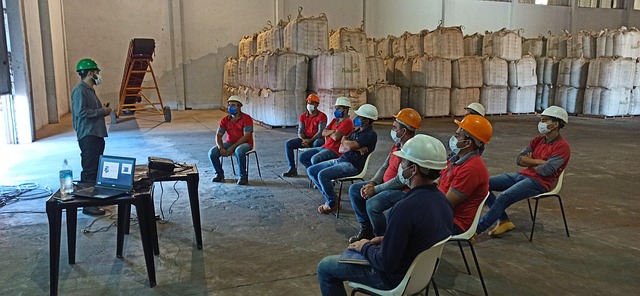Share This Article:

Sarasota, FL (WorkersCompensation.com) -- Earlier this month, the U.S. Department of Labor’s Occupational Safety and Health Administration announced a proposed rule that would revise regulations over who can be present during on-site inspections.
The proposed rule clarifies that employees may authorize an employee or a non-employee as their representative if the OSHA compliance officer determined that a third party is “reasonably” necessary to conduct and inspection. The proposed change would clarify that the third-party representatives are not limited and gave the examples of industrial hygienists or safety engineers.
“Third-party representatives may be reasonably necessary because they have skills, knowledge or experience that may help inform the compliance officer's inspection,” the DOL said in its announcement. “This information may include experience with particular hazards, workplace conditions or language skills that can improve communications between OSHA representatives and workers.”
According to the Occupational Safety and Health Act, employees and employers have the right to have a representative accompany OSHA officials during workplace inspections. The representation allows the inspector to do a complete and thorough job during their investigation and gather more information.
"Congress considered worker participation a key element of workplace safety and health inspections when it passed the Occupational Safety and Health Act,” Assistant Secretary for Occupational Safety and Health Doug Parker said in a statement. "This proposal aims to make inspections more effective and ultimately make workplaces safer by increasing opportunities for employees to be represented in the inspection process."
The proposed rule would also clarify the relevant knowledge, skills or experience with hazards or conditions in the work place, or language skills of third-party representatives may be necessary to help the Compliance Safety and Health Officer (CSHO) in their physical inspection of the workplace. OSHA said the changes will help with inspections by better enabling employees to select representatives of their choice to accompany CSHO’s during inspections. That representation is important, OSHA said, to ensure the agency gets all of the necessary information it needs about the worksite conditions and hazards.
The proposed rulemaking resurrects an interpretation made during Former President Barrack Obamas administration that allowed employee representatives. In 2013, OSHA issued a letter of interpretation by former OSHA Deputy Assistant Secretary Richard Fairfax that allowed employee representation. In that case, questions from the United Steelworkers of America in Pittsburgh had asked the agency whether workers at a worksite without collective bargaining agreements in place could designate a union or community organization representative to act on their behalf during inspections, and walkaround with the OSHA inspectors during inspections.
OSHA answered “yes” to both questions, citing the OSH Act, the OSHA regulations and the Field Operations Manual.
In part, the legislation reads “The representative(s) authorized by employees shall be an employee(s) of the employer. However, if in the judgment of the Compliance Safety and Health Officer, good cause has been shown why accompaniment by a third party who is not an employee of the employer (such as an industrial hygienist or a safety engineer) is reasonably necessary to the conduct of an effective and thorough physical inspection of the workplace, such third party may accompany the Compliance Safety and Health Officer during the inspection.”
The agency’s interpretation of the law found that “reasonably necessary” means that the representative will make a “positive contribution” to the inspection – either by their experience and skill or by their ability to communicate with workers in their own language.
In response to the letter, the National Federation of Independent Businesses (NFIB) sued OSHA in federal district court on the grounds that the letter of interpretation amounted to a legislative rule adopted in violation of the Administrative Procedure Act of 1946, which required the agency to proceed through the formal rulemaking process, allowing for public notice and comment periods.
OSHA moved to dismiss the action, but the court found that NFIB had a case. In 2017, under administration of former President Donald Trump rescinded the guidance, and NFIB withdrew its claim. The Trump administration also removed a section entitled, “No Certified or Recognized Bargaining Agent” from the Field Operations Manual, which had previously instructed inspectors that workers without a bargaining agent could authorize third-party individuals or organizations to be their representatives during an inspection.
According to the DOL, stakeholders have until Oct. 30 to comment on the proposed changes.
AI california case management case management focus claims compensability compliance courts covid do you know the rule emotions exclusive remedy florida FMLA glossary check Healthcare health care hr homeroom insurance insurers iowa leadership medical NCCI new jersey new york ohio osha pennsylvania roadmap Safety state info technology texas violence WDYT west virginia what do you think women's history women's history month workcompcollege workers' comp 101 workers' recovery Workplace Safety Workplace Violence
Read Also
About The Author
About The Author
-
Liz Carey
Liz Carey has worked as a writer, reporter and editor for nearly 25 years. First, as an investigative reporter for Gannett and later as the Vice President of a local Chamber of Commerce, Carey has covered everything from local government to the statehouse to the aerospace industry. Her work as a reporter, as well as her work in the community, have led her to become an advocate for the working poor, as well as the small business owner.
Read More
- Apr 28, 2025
- Liz Carey
- Apr 28, 2025
- Frank Ferreri
- Apr 27, 2025
- Frank Ferreri
- Apr 27, 2025
- Chris Parker
- Apr 27, 2025
- Chris Parker
- Apr 25, 2025
- Liz Carey




